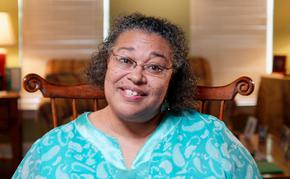The views expressed in our content reflect individual perspectives and do not represent the authoritative views of the Baha'i Faith.
Ultimately, the eradication of poverty will not be an exercise in the distribution of material resources alone, a matter of mere accounting.
To address poverty in real and lasting ways will be to build new patterns of society itself, reflecting moral and spiritual principles such as equity, solidarity, justice, and compassion. It will involve the construction of new ways of being together, new ways of relating to one another, new ways of organizing our individual and collective affairs. And in this, high-income areas have no more knowledge or expertise than low-income ones. The village in the highland steppes is every bit as capable of building cohesive and vibrant patterns of social life as the apartment complex in the metropolis.
The challenges facing those with few material resources are significant. Such populations will need support, education, training, and assistance, the same as any other. What must be plainly acknowledged, however, is that no group or region has the capacity to eradicate global poverty on its own, according to its particular views and guided by its understanding alone. From a practical standpoint, the magnitude of transformation required is simply far too great. But a moral reality comes into play as well–that the advancement of all humanity requires the efforts of all humanity. Just as every member of the human family has the right to benefit from a materially, socially, and spiritually prospering civilization, every member has the capacity to contribute towards its construction:
The general rights of mankind must be guarded and preserved. All men must be treated equally. This is inherent in the very nature of humanity….
The arrangements of the circumstances of the people must be such that poverty shall disappear, and that every one as far as possible, according to his position and rank, shall be comfortable. Whilst the nobles and others in high rank are in easy circumstances, the poor also should be able to get their daily food and not be brought to the extremities of hunger. – Abdu’l-Baha, Abdu’l-Baha in London, p. 29.
To embrace the implications of this overarching principle is to acknowledge that no group already has what is needed to bring about the world we collectively desire for ourselves and our children. In this, the financially wealthy are as dependent on the underprivileged as is the reverse. Similarly, the “developed” world will have as much to learn from the “developing” world as vice-versa in the coming years. This might be challenging to some, and runs counter to ideologies of exceptionality or uniqueness. But dependence of this kind, expressed through relationships of mutual support and assistance, is a source of great strength, not weakness. Through it, expression is given to the fundamental principle that social action should operate on the ideal of universal participation. And on its foundation, areas that have long been excluded or discounted can come to be embraced as vibrant sources of ideas, tools, resources, and approaches every bit as effective–and needed–in high-income areas as low ones.
Translating these ideals into practical realities will involve challenges to be sure, not least for multilateral bodies such as the Commission for Social Development. But Agenda 2030 is a universal process, and that very universality provides a powerful means for re-conceptualizing the role that various actors–particularly less affluent populations themselves–play in the eradication of poverty.
Embracing the constructive potential of thousands of grassroots communities, each with its own circumstances and realities, will be an intensely local process. As such, progress will come less from finding the “right” policy intervention and applying it everywhere, than by coming to a deeper understanding of the process by which effective approaches are determined, implemented, and modified.
What might this look like in practice? Steps that might help the United Nations and the Commission identify and embrace capacity wherever it is found include:
- Expand conceptions of expertise and sources of solutions. International fora often seek solutions from a relatively narrow set of sources. Research academics and policy specialists offer contributions that are valuable indeed. But over-reliance on such resources can impoverish a discourse, leading to fixation on technical recipes and policy fixes. Insight is generated also by communities working to nurture more humane patterns of social interaction, by individuals striving to build capacity in others, by institutions seeking to apply traditional knowledge to contemporary challenges. Expertise of these kinds must be consciously sought and included in global discourse.
- Seek knowledge from those experiencing policy. Representatives of communities who will be affected by policies need to be included in the formulation of those policies, as a matter of justice. Yet “a place at the table” can easily devolve into tokenism and optics. Decision-makers must therefore be prepared–indeed, eager–to learn meaningful lessons from partners on the ground. Only to the degree that they embrace grassroots collaborators in this way can it be said that their initiatives truly seek insight wherever it can be found.
- Seek universal solutions from low-income populations. Gone are the days when high-income areas were openly exalted as the model of what society should be. No longer, then, can the achievements of some be dismissed as applicable only to those with limited financial resources. If the international community is to sincerely recognize the capacity of low-income areas, it must be ready to acknowledge those areas’ advantages, embrace their accomplishments, and learn from their experience.
- Capture narratives behind successful approaches. Collecting numerical data is important, but 50 people actively contributing ideas and asking questions is much different than 50 passive bystanders. In addition to detailing policies that achieved results, it will be important to capture and tell the story behind successes–how the initiative was developed, how it evolved over time, how objections were resolved, how features were communicated. Qualitative analysis of this kind helps frame thinking in terms of lessons learned and allows insights to be extracted, aggregated, and applied to future action.
[This statement from the Baha’i International Community was presented to the United Nations’ 55th Session of the Commission for Social Development on January 25, 2017. Quotes from the Baha’i teachings have been added.]

















Comments
Sign in or create an account
Continue with Facebookor